Legal and administrative irregularities in appointing the Auditing Experts
After publishing the data about the electoral expenditures for the two last campaigns, Open Data Albania, in an effort to ensure as much transparency as possible over the official data concerning the 2013 Electoral Campaign, found certain violations of the law in the organization of work by the Central Election Commission (CEC). Such violations have led to serious irregularities and shortcomings in the process of selection and appointment of the Licensed Auditing Experts for auditing the funds received for the 2013 electoral campaign.
Thus, the CEC is assigned by law (Article 91 of the Electoral Code) to appoint by lot a licensed auditing expert for each electoral subject, party, or participant running in the election. The drawing of such lot as a very important process in ensuring transparency over the financing of the political parties in electoral campaigns requires a strict application of the law in respect of the principles of transparency and impartiality.
Violations and Irregularities include:
1. The lot for the 2013 Campaign was drawn on 02 August 2013 in a meeting of the same date in the presence of four members of the CEC, and representatives of the political parties. The Decision for Announcing the Election Results was registered as Decision No. 752, and it was issued on 02 August 2013. According to the law, specifically Article 91, point 1, the lot must be drawn no later than 45 days after the announcement of the election result. The law implies that the deadline for drawing the lot starts on the date the election results are announced, and expires 45 days after that. Actually, the results of the 2013 parliamentary elections were announced by Decision of the CEC No. 759, dated 06 August 2013. This means that the lot was drawn four days before the expiry of the deadline. Bringing thus the lot date forward is in contradiction with the legal deadline, and hasty without a legal or administrative justification.
2. Such a failure in meeting the legal deadline deepens further shortcoming with the violation at the same time of Article 92 of the Electoral Code “Selection of the Auditors by the CEC„. Specifically, point 2 of this article contains the criteria that the list of experts for this lot should meet. The article specifies that “The list should contain at least 20 experts who have been exercising this profession in the last 5 years „. In contradiction with this article, the lot of August 2nd, 2013, was drawn with an initial list of only 9 experts. These 9 experts were appointed for auditing 68 electoral parties, including both parties and individuals. Thus, each expert will have to audit 7 to 8 subjects as an average. The requirement for providing an initial list of experts that contains at least 20 participants is also foreseen by Instruction No. 8, dated 25.03.2009 “On Appointment of licensed Accounting Experts for auditing the funds received and spent by the electoral subjects for their electoral campaign”. Having not met this legal requirement, the CEC should have cancelled the lot procedure, and repeat it at a later date within the legal deadline. The decision of the CEC does not contain any interpretation of why the lot was drawn in violation of the legal requirement of having a list of at least 20 experts.
3. The failure of the Legal Experts to show up at the lot demonstrates, first of all, a shortcoming of the work of the respective administration staff of the CEC. The notification about the date and time of the lot in the two previous elections was made by sending a nominal official letter via mail by the CEC Chair Arben Ristani. The invitation for participation in the lot in 2009 and 2011 was sent officially via mail to each accounting firm or individual experts that met the participation criteria. This good model of official notification was not followed for the 2013 elections. The notification was only made in the media for a general audience, while an invitation was only sent to those experts who are part of an official list, i.e., members of the Institute of Authorized Accounting Experts. The public notification was also associated by another defect, i.e. lack of its publication on the CEC official website.
Fiscal Impact Assessment of Structural Reforms – Case Study on Albania
/in Publications /by adminThe country case studies in this volume represent just such an in-depth needs assessment for countries in the region, on an issue that is both critical and insufficiently addressed: how the fiscal impacts of structural reforms are integrated within the budget process. Working closely with Montenegro’s Ministry of Finance and with support from the World Bank’s SAFE trust fund, the Center of Excellence in Finance(CEF) identified authors with the right knowledge to assess the situation and offer recommendations for improvement. The Fiscal Impact Assessment of structural Reforms (FIASR) project is part of a long-term CEF program, Building Capacities for Policy Design and Implementation. The capacity development needs that the case studies have identified will be addressed through a series of CEF learning events entitled Strategic Planning and Budgeting from 2013 to 2015.
For this study, the working group of AIS focused on the most important structural reforms undertaken over the last 10 years in five sectors: Enterprise, Financial, Human Resource Development and Labor Market, Administrative Services, and Network Industry.
The main sources of data were taken from the Ministry of Finance, the Institute of Statistics, the Bank of Albania, line ministries and other responsible institutions, sector strategies, and the related legal framework in the five sectors examined, as well as signed agreements with other countries or international organizations. The European Commission’s progress reports on Albania and the reports from international organizations, such as the World Bank and UN, were also taken into consideration.
This case study consists of four sections. The first introduces the methodology used for this case. The second introduces the process of budgeting, not only its importance but reforms made during recent years, the legal framework, detailed procedures, and the main actors of this process. The third section focuses on the reforms undertaken in key sectors, institutions, and processes to include the cost of structural reforms in the state budget. The last section gives some conclusions and recommendations for all of the issues treated above.
Publication on the case study for Albania.
Link to the complete publication.
Hackathon Day in Tirana
/in Events, Press Releases /by adminThis event is a gathering of friends, activists and citizens that want to give their contribution through visualizations or projects, and help the general opinion.
Hackathon is a casual meeting, where we collaborate as a team in writing applications, downloading data, creating visualizations or publishing analysis by using the open data. This is done in order to show support and to encourage the implementation of open data policies from the government, as well as local and international institutions.
This year’s theme is: IT in Service of the Civil Society!”
A large group of activists, programmers, designers, economists contributed in the event.
Action – Cleaning of the Castle of Bashtova
/in Events, Press Releases /by Besi HysaAction for Cleaning the Castle of Bashtova – 01 May 2014.
This is the action of a group of volunteers of the “Act Now as a Smart Tourist” project. About 40 volunteers participated in this action for cleaning and promoting the castles along the Albanian coast.
The Castle of Bashtova is a monument of the first category and is located next to the village of Bashtova, about 3-4 km in the North of Shkumbini River. The castle was built in the 15th century and served the venerians. The Castle is a witness of traces of civilizations. Its surroundings are still intact. Although very close to Tirana, only a few people are aware of its existence, or visited it.
The problem with such monuments is related not only to their pollution, but also with the lack of their promotion, as a result of which they are not used as tourist destinations.
In addition to contributing to cleaning the area on the eve of the summer tourist season, our activities also intend to raise awareness for better management of our monuments and their environment, and create more possibilities for using their cultural and tourist potential. We also try to publicly invite more citizens to visit our picturesque coast, not only for its nature, but also for its national and monumental values.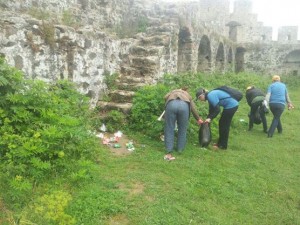
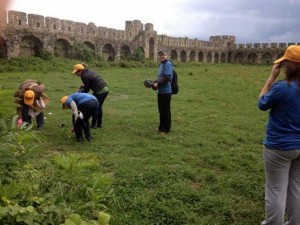
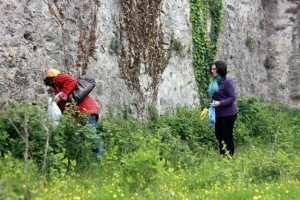
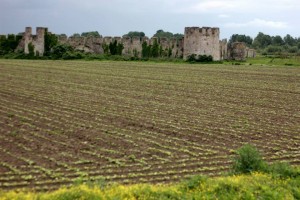
Volunteer Action: “Castles of my coast”
/in Press Releases /by Besi HysaOn October 18th, we organized the “Castles of my coast” action in Borshi Castle with the participation of 120 volunteers.
This castle is located in a tourist area along the coast, and it is very interesting for its tourist and environmental potential. Its maintenance leaves a lot to be desired. The road to the castle was blocked before the action because of sliding stones.
Our 120 volunteers reacted under the “Act Now as a Smart Tourist” motto, freeing the road from stones.
The castle was also cleaned of the waste produced during the latest tourist season.
On October 19th, there was another action organized with the participation of 60 volunteers for cleaning the fortress in the village of Qeparo. This is one of the most beautiful villages along the Albanian coast, but most of its inhabitants have immigrated leaving the village neglected. In addition to our contribution to cleaning at the end of the summer tourist season, we also tried to raise the public awareness for a better management of our monuments and environment, and for creating possibilities to make use of their cultural and tourist potential.
On October 20th, the volunteer action continued in Porto Palermo.
Porto Palermo is also one of the most beautiful castles in the country with a long history of battles for protecting the Albanian territory. The castle is somehow better maintained, but the site is previously used as a military basis, which has created problems of environmental pollution.
After the actions, the participants made sure they also raised awareness about this important environmental site, promoting its beauty through the social networks facebook and blogs.
The event was covered on TV through spots that promoted citizens’ reaction and action.
The volunteers were mainly from Tirana, and were joined by activists of three local organizations and students from Borsh secondary school.
In this Actions, Smart Tourist Albania was also joined by Tirana Ekspres; ‘Rojat e Kepit’ Club; World Vision Vlora; SEEP Albania, and other organizations and initiatives.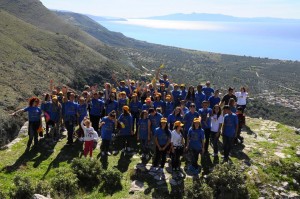
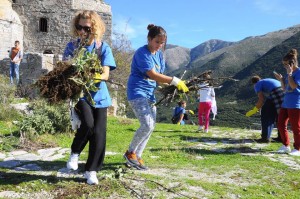
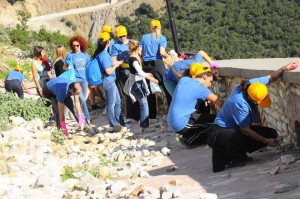
Aksioni Vullnetar “Kalatë e Bregut tim” në Kalanë e Bashtovës
/in Events, Homeposts /by aranita“Kalatë e bregut tim” është një aksion i një grupi vullnetarësh të projektit “Act Now as a Smart Tourist” http://smarttourist.al . Aksioni synon pastrim nga mbeturinat dhe promovim të monumenteve fortifikime në Brigjet e Shqiperise. Këtë rradhë Aksioni ishte në Kalanë e Bashtovës dhe u realizua në datën 1 Maj 2014. Ky projekt mbeshtetet finaciarisht nga Programi i Granteve të Vogla i Komisionit për Demokraci i Ambasadës së SH.B.A.-së në Tiranë.
Kalaja Bashtovës është monument i kategorisë së parë dhe ngrihet pranë fshatit të Bashtovës në një distancë prej 3-4 km, në veri të grykëderdhjes së lumit të Shkumbinit. Kështjella është ndërtuar në shekullin XV dhe u ka shërbyer venecianëve. Kalaja ka trajtë katërkëndore me përmasa 60 x 90 metra. Pjesa perëndimore e saj është rindërtuar në shekullin XVIII. Muret e saj kanë një lartësi prej 9 metrash. Kalaja e Bashtovës është një monument kulture që dëshmon për gjurmët e qytetërimit dhe civilizimit. Rrethinat e saj kanë mbetur të plota.
Pavarësisht se shumë pranë Tiranës, shumë pak prej nesh janë në dijeni apo e kanë vizituar këtë monument.
Veç kontributit me pastrim në fillim të sezonit turistik veror, aktiviteti ynë synon edhe sensibilizim për menaxhim më të mirë të monumenteve dhe mjedisit të tyre, krijimin e më shumë mundësive për të shfrytëzuar potencialin kulturor e turistik që ato mbartin. Gjithashtu edhe promovimi dhe ftesa publike për të nxitur të tjerë të vinë dhe të vizitojnë zonën jo vetëm për natyrën e bregut piktoresk por edhe për vlerat kombëtare e monumentale.
Get Online Week 2014 në Media
/in Media Coverage @en /by Besi HysaFokusi kryesor i GOW 2014 është në punësimin dhe në profesionet dixhitale, në përputhje me politikën dhe industrinë, përpjekjet për të arritur norma më të larta të punësimit dhe të përshtatjen më mirë të ofertës me kërkesën për e-Skills.
Invitation for Participation at “Hackathon Albania 2013”
/in Homeposts, Press Releases /by aranitaThis event is a gathering of friends, activists and citizens that want to give their contribution through visualizations or projects, and help the general opinion.
Hackathon is a casual meeting, where we collaborate as a team in writing applications, downloading data, creating visualizations or publishing analysis by using the open data. This is done in order to show support and to encourage the implementation of open data policies from the government, as well as local and international institutions.
This year’s theme is: IT in Service of the Civil Society!”
If you are an activist, programmer, designer, economist, you are welcome to contribute by participating in Hackathon Albania, on Saturday, December 7, 2013, from 9:00 AM to 5:00 PM, at Tirana’s downtown.
Be part of an active society by joining us!
https://www.eventbrite.com/e/hackathon-albania-2013-tickets-9490782185
Central Election Commission violates the Electoral Code concerning Financing of Electoral Subjects
/in Press Releases /by aranitaLegal and administrative irregularities in appointing the Auditing Experts
After publishing the data about the electoral expenditures for the two last campaigns, Open Data Albania, in an effort to ensure as much transparency as possible over the official data concerning the 2013 Electoral Campaign, found certain violations of the law in the organization of work by the Central Election Commission (CEC). Such violations have led to serious irregularities and shortcomings in the process of selection and appointment of the Licensed Auditing Experts for auditing the funds received for the 2013 electoral campaign.
Thus, the CEC is assigned by law (Article 91 of the Electoral Code) to appoint by lot a licensed auditing expert for each electoral subject, party, or participant running in the election. The drawing of such lot as a very important process in ensuring transparency over the financing of the political parties in electoral campaigns requires a strict application of the law in respect of the principles of transparency and impartiality.
Violations and Irregularities include:
1. The lot for the 2013 Campaign was drawn on 02 August 2013 in a meeting of the same date in the presence of four members of the CEC, and representatives of the political parties. The Decision for Announcing the Election Results was registered as Decision No. 752, and it was issued on 02 August 2013. According to the law, specifically Article 91, point 1, the lot must be drawn no later than 45 days after the announcement of the election result. The law implies that the deadline for drawing the lot starts on the date the election results are announced, and expires 45 days after that. Actually, the results of the 2013 parliamentary elections were announced by Decision of the CEC No. 759, dated 06 August 2013. This means that the lot was drawn four days before the expiry of the deadline. Bringing thus the lot date forward is in contradiction with the legal deadline, and hasty without a legal or administrative justification.
2. Such a failure in meeting the legal deadline deepens further shortcoming with the violation at the same time of Article 92 of the Electoral Code “Selection of the Auditors by the CEC„. Specifically, point 2 of this article contains the criteria that the list of experts for this lot should meet. The article specifies that “The list should contain at least 20 experts who have been exercising this profession in the last 5 years „. In contradiction with this article, the lot of August 2nd, 2013, was drawn with an initial list of only 9 experts. These 9 experts were appointed for auditing 68 electoral parties, including both parties and individuals. Thus, each expert will have to audit 7 to 8 subjects as an average. The requirement for providing an initial list of experts that contains at least 20 participants is also foreseen by Instruction No. 8, dated 25.03.2009 “On Appointment of licensed Accounting Experts for auditing the funds received and spent by the electoral subjects for their electoral campaign”. Having not met this legal requirement, the CEC should have cancelled the lot procedure, and repeat it at a later date within the legal deadline. The decision of the CEC does not contain any interpretation of why the lot was drawn in violation of the legal requirement of having a list of at least 20 experts.
3. The failure of the Legal Experts to show up at the lot demonstrates, first of all, a shortcoming of the work of the respective administration staff of the CEC. The notification about the date and time of the lot in the two previous elections was made by sending a nominal official letter via mail by the CEC Chair Arben Ristani. The invitation for participation in the lot in 2009 and 2011 was sent officially via mail to each accounting firm or individual experts that met the participation criteria. This good model of official notification was not followed for the 2013 elections. The notification was only made in the media for a general audience, while an invitation was only sent to those experts who are part of an official list, i.e., members of the Institute of Authorized Accounting Experts. The public notification was also associated by another defect, i.e. lack of its publication on the CEC official website.
Electoral Spending as Open Data
/in Press Releases /by aranitaSome countries lack the process of the publication and transparency for Electoral Expenditure. Former communist countries, countries with a new democracy or the ones who do not acknowledge political freedom, have not put into law the obligation to publish the Electoral Expenditures. Even in places where this law exists, there are big difficulties in building models and control mechanisms that ensure information, transparency and public debate on Electoral Expenditure.
Albania lacks the process of transparency over electoral expenditures. Only in 2008, the Parliament approved the law that obliged Political Parties to report their finances to the Central Election Committee (the institution that manages the elections)[1]. This finance tables are not published from the parties. The Central Election Commission publishes some reports with abbreviated information, in a format that is very difficult to find, while the data is not available for use (excel; PDF)[2]. The political parties’ expenditures are never made public during the electoral campaign. Even when they are published on the Central Election Commission website, this is done 6 months after the elections in the best case, and after two years in the worst scenario. The Albanian Media is not informed about the electoral expenditures; the public debate based on data is not present and the citizens are not informed on these expenditures. Very few individuals have the knowledge about the political parties’ legal obligation in publication the electoral expenditures.
To ensure transparency with the Public Spending, Open Data Albania worked in building tools and graphic presentations of Electoral Spending (2009 & 2011)[3]. This was made possible by programmers and designers of the Albanian Institute of Science. Till now our project was focused:
The realization of this idea was something brand new for the country. No graphic presentation has illustrated before the expenses of the electoral subjects in this country. In addition, since the political parties financing in Albania has different features in comparison to other countries, the graphic tools that will be build will be brand new and compatible only with countries that have an electoral system similar to Albania’s. This have to do with giving to individuals a more transparent model in understanding how the electoral subjects spend their money, who are the donors of the political parties, who are the most sensitive points of the electoral campaigns.
This leads to public debates between the parties or to an account – giving process between the subjects and their respective supporters
[1] http://open.data.al/en/lajme/kat/kid/81/titulli/Shpenzime%20Elektorale%202011 & http://open.data.al/en/lajme/kat/kid/83/titulli/Shpenzime%20Elektorale%202009
[2] http://open.data.al/sq/lajme/lajm/id/782/Tema-Financimi-Wake-Up
http://open.data.al/sq/lajme/lajm/id/767/Zgjedhjet-vendore-te-2011-partite-shpenzuan-2.6-milion-euro-
http://open.data.al/sq/lajme/lajm/id/764/Cilet-jane-doreleshuarit-e-zgjedhjeve-lokale-2011-shumat-ne-10-mije-dollare
http://open.data.al/sq/lajme/lajm/id/756/Fushata-zgjedhore-fillon-pa-transparence-financiare
http://open.data.al/sq/lajme/lajm/id/755/Open-Data-Fushata-zgjedhore-filloi-pa-transparence-financiare
http://open.data.al/sq/lajme/lajm/id/754/Partite-shqiptare-injorojne-thirrjet-per-transparence-te-financimeve
http://open.data.al/sq/lajme/lajm/id/753/Albania-Parties-Ignore-Call-For-Donor-Transparency
[3] Ligjin nr. 10.019, datë 29.12.2008 “Kodi zgjedhor i Republikës së Shqipërisë”.
[4] http://www.cec.org.al/images/stories/zgjedhje-vendore/2011/raportet_auditimi/partite_politike/19_PSD.pdf
Workshop- Academic’AL
/in Events /by admin26 June 2013
Instituti Shqiptar i Shkencës ka organizuar një 26 qershor 2013 një workshop me pjesëmarrjen e përfaqësuesve të lartë nga universite të vendit. Moderator nderi i aktivitetit ishte Prof. Petraq Papajorgji një nga akademikët më të shquar në shkenca teknologjike në Shqipëri që mban disa grada shkencore, si dhe fitues i disa çmimeve kombëtare për kontributet e tij në arsim.
Pjesa e parë e workshopit u përqëndrua në prezantimin e websitit Academical dhe filozofisë së Open Access and Open Science. Pjesa e dytë konsistoi më debate në forumin e debatit, diskutimet dhe pytje mbi rolin e kërkimit shkencor në Shqipëri, vlerat e dhe vizibilitetit e tij në lidhje me institucionet e kërkimore ne nivel local dhe ndërkombëtar. Në workshop pati edhe propozime konkrete mbi vijueshmërinë e projektit Academical, si dhe aktiviteteve të mëtejshme të tij.
Link: http://academical.al/